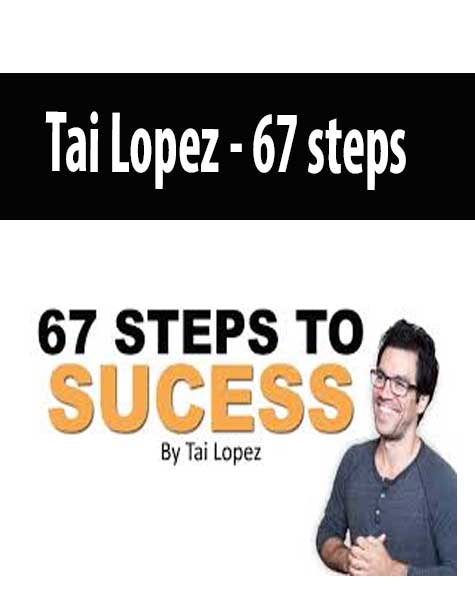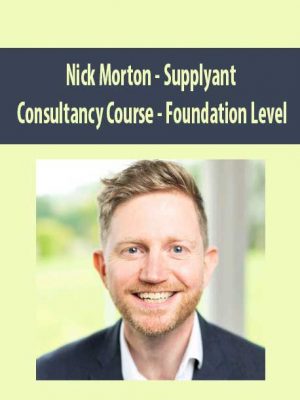Tai Lopez – 67 steps
$697.00 Original price was: $697.00.$40.00Current price is: $40.00.
Proof of item:
What is The “67 Steps” Program?
The last couple of months I’ve stumbled upon something I’ve never come across before on the internet..
It’s a video course where Tai Lopez (An investor, entrepreneur and author) talks about 67 important lessons he learned throughout his life.
By balancing your health, your wealth and your social life you’ll reach a state of eudaimonia.Which is a fancy word for “excellent life quality” – or as Tai calls it; “The Good Life”
Tai illustrates each topic with personal stories from his life or insights he picked up from reading books.
And he has read quite a few… (5000+ )
The course is was completely free and you even got a additional copy of “Managing Oneself” by Peter Drucker to discover your personal strengths.
This course is gold
It this review I’m going to share the most important lessons I’ve learned from the course and how I plan to implement those steps into my life (the ones I’ve found relevant at least)
At the moment I’m at 16 19 21 different key lessons.
Note: These are my personal interpretations of what his 67 steps mean. Different conclusions are always possible.
Let’s go.
1) Be Worth A Damn
To deserve the life you want, you’ll have to do the actions that are necessary.
He says most people are delusional. We somehow think we’re entitled to “the good life” without putting in the effort required to actually get there.
When you look at your life today, would you objectively say you deserve a higher life quality than others – according to the work you’ve put in? Are you better than your competition?
Look around in your life, who would you bet on to make a million dollars? Would you bet on yourself? If not – what needs to change?
Application & Thoughts
Take on an attitude of full responsibility for your own life. If you want a higher life quality there will be things you’ll have to do and things you’ll have to give up. This way you’ll increase your chances of attaining the life you desire (duh).
How?
This made me look at my life and compile a list of essential habits that are required to build a great life. Then I proceeded to break these down into actionable steps to implement gradually.
2) Be Adaptable
This step is based on the theory of evolution which states that the person who’s best-adapted to his environment is the one that’ll survive. “The good life” doesn’t go to people who don’t notice the “change of seasons.”
The person with static skills will never thrive in an dynamic environment. Look for changes & trends and use those to your advantage. Make choices on a long-term basis.
Application & Thoughts
Be aware of your current actions and surroundings. Check up on your habits and see if the way you’re living is an ESS (evolutionary stable strategy) meaning you quantify your decisions based on long-term thinking.
Devise a survival strategy for your life.
- Is eating at McDonalds a maintainable strategy?
- Is spending money on clothes and dinners a maintainable strategy?
- Is working a 9-5 job without added entrepreneurship a maintainable strategy?
The way I do this is by staying aware of political, social, economic and technological trends.I wouldn’t watch the news (solely) since they are heavily biased towards ratings.
Subscribe to different websites who keep you updated of occurring events that may impact your life.
3) Be Humble
Everyone has a piece of gold that we can extract from them. We find humility in what we learn from others, even the ones we think can’t provide us any value.
Be teachable by people who achieved far greater results than you have. Look for deep domain expertise (does he/she actually have the knowledge?) and references (does he/she have the results you desire?)
Many people are unhumble know-it-alls, unable to listen to people who know more than they do.
Application & Thoughts
Spend more time learning from the ones that came before you and less from your own mistakes. Spend your money on books & seminars. Spend more time tracking down and networking with mentors.
This will enable you to avoid a lot of mistakes by “standing on the shoulders of giants”. It allows you to tap into the collective wisdom of great minds that have come before you.
4) Get A Mentor
Mentors will shave years of your learning curve and I recommend you to get one. Whether this is in books, seminars or real-life.
Mentor others too. Tai talks about the law of 33%, which states that you should spend;
- 1/3 of your time with people below you (the ones you mentor)
- 1/3 of your time with people on your level (close friends, brothers in arms)
- 1/3 of your time with people above you (your mentors)
Find people who aren’t full time teachers but are actually making money with the things they’re preaching about. Keep in mind that;
- Good mentors are busy (He mentions a story in which a man tried 17 times before he got mentored)
- Some are burned up
- Build the relationship slowly (Establish contact over a 18 month period)
- Don’t be a leech, provide value by using the concept of reciprocal kindness.
- Interview people you admire on a self-created platform
- Buy and read their books
Application & Thoughts
Make a list of 10 mentors and contact all of them. A great way to create a networking spreadsheet is by using the free ebook from John Corcoran – I’ve found it to be invaluable.
I don’t necessarily believe the law of 33% is that relevant/practical. Learn from the great and teach it to others (to improve your memory)
5) Ignore The 99%
Most people’s opinions are simply reflections of social bias. Look for references and signs of expertise before taking advice.
- Don’t trust health advice from a personal trainer that’s overweight.
- Don’t take money advice from someone’s who’s constantly struggling financially.
- Don’t listen to relationship advice from someone who doesn’t have a (girl)friend(s)
Select the people you listen to carefully.
Many people think they know what they’re talking about yet rarely do – me included. Go straight to the top of people that can give you advice and cut out the average.
This is a BIG reason why I’m so fond of books. It allows us to learn from the greatest and copy their relative successes by adopting their thinking patterns.
Application & Thoughts
See the difference between your “rich” friends and “poor” friends in each area. The friends who are “rich” in health;
- How do they think?
- How do they eat?
- How do they train?
Same goes with financially rich people;
- The way they manage their money
- Their spending habits
- How much they read
- What they talk about
- How much tv they watch
Same with people who have great relationships;
- How they treat others
- How they behave in company
- Their body language
Invert their behavior and see how it pays off.
Overall be careful who you imitate. Through observational learning it’s possible to instill bad patterns in you that you remain stuck with for a great while (e.g. your dad that smoked, your splurging habits of your friends, …) We admire status and prestige in others and are sometimes blinded by the way they’ve acquired it.
Find highly concentrated knowledge and not just random people who don’t know what they’re talking about.
Observe and select the ones you learn from carefully. Cut out the average.
6) Grind It Out
All (sustainable) success comes from “the grind”. Process over events.
You have less chance of winning the lottery than you have of;
- Getting hit by lightning
- Being eaten by a shark
- Being hit by a piece of scrap metal from a plane
Yet how many people buy lottery tickets each day?
Look at your life as one big piece of marble and everyday you grind away one small piece of imperfection. Tai calls this “the sculpture approach”. Choose the general direction you want to go and adjust accordingly. Most people are looking for “events” as opposed to “grinds”.
Health, wealth and love don’t come in events but by carefully selected actions every single day. Don’t think others have it easier than you – they don’t.
You often come to the conclusion that other peoples’ good fortune is derived from a factor outside of their control, that their favorable achievements can be attributed to circumstances. This is because you’ve never seen the hard work, doubts and pain involved that gave birth to those successes.
We don’t observe the inner workings of another and are therefore more inclined to ascribe their successes to outside forces.
Tai compares this to observing the passing seasons.
“We Only Observe People Who Are In The Fall (Harvest) Of Their Life. Forgetting About The Longs Months Of Planting In The Spring And Cultivating During The Summer That Preceded”
Most are delusional as to how much time it’ll take to get the results they’re looking for. They’ve never planted nor cultivated their crops – yet hope to harvest in the fall.
Application & Thoughts?
Set a realistic time-frame it’ll take to achieve expertise. Focus on planting and cultivating good actions instead of hoping for events.
A mind shift from events towards processes.
…
And don’t ever buy lottery tickets, that makes you a fool – seriously.
7) Escape The Salary Mentality
We have been conditioned all our lives to feel helpless and dependent on others. By being constantly provided by our school, our parents and later our jobs with secure income we have become “learned helpless” meaning we have hardwired our brain to need a steady/regular income.
Get away from this. Stop getting paid for the time you spend in a certain place but start wiring your brain to get paid for performance.
It will make you responsible for your own financial support by actively searching new opportunities you can turn into a profit. If you’ve hardwired your brain in this salary-slave-mentality you become blind to new opportunities.
Application & Thoughts
Ask your employer to get paid according to your performance instead of your time. Tell him your reasoning and ask him how you can improve your performance. This is a win-win.
Secondly analyze your strengths (see step 12) and skills you can combine to create value for others.
- Are you good at repairing? Repair some stuff from people you know
- Do you know about health & fitness? Make a training program and sell it to your friends
- …
Initially it’s not about the profit you make but about the re-wiring of your brain to avoid downward spirals of bad habits.
8) Life Long Learning
-
“Survival Machines That Can Simulate The Future Are One Jump Ahead Of Survival Machines That Can Only Learn Based On Trial And Error”
Tai recommends to learn from the failures of others instead of only relying on your own. Trial and error takes times and energy – frequent errors can even be fatal. Simulations (derived from books) are both safer and faster.
How?
Learn from books!
This is invaluable. We’ve been conditioned by school that learning is boring and unrewarding but this is simply not true.
It’s not enough anymore in our current information-society to be a mere expert – let alone a generalist.
Tai recommends everyone to become a so-called “renaissance-man” or polymath. Become highly specialized in one particular field and develop conversational level depth in all other subjects. Become so good at one particular field they can’t ignore you.
“Be Impressive Beyond Belief In One Thing”
This will allow you to stir & combine more ideas in your mind which will blend to form great opportunities. Tai recommends learning about science, music, language, history & culture (literature, art & poetry)
Application & Thoughts
Life-long continuous learning. I recommend to master health, social and your area of expertise first before spreading out since those are most practical. Learn from others’ mistakes first.
Here’s how to read a book;
- Read non-fiction books that help improve your life quality.
- Ask yourself; How will I use this information to improve my life quality/move me closer to my goals?
- What questions will this material answer?
- Don’t read everything! (20%ofthebookyou’re reading has 80% of the content; It’s you job to find it/filter it out. See yourself as a gold-miner)
- Read cover, back, contents, introduction and conclusion first then select chapters that help you answer the question you had in step 3
My Guide To Optimal Learning
9) Be Tough
Tai recommends everyone to take on a more stoic view on life. Meaning you should “sacrifice today for a better tomorrow”. We – as a society – have become too soft. Too YOLO.
“Adversity Makes Men And Prosperity Creates Monsters.”
Spartans used to go through the agoge learning stealth, cunning, fighting skills and mental resilience from the ages of 7(!) till 21.
Nowadays? There’s nothing like that.
We suffer from a lack of role models, an estrogen inducing diet, media propaganda, too much comfort and more stuff that is making us a shade of our former selves.
Application & Thoughts
Here’s some I do;
- Take a cold shower every morning
- Eat a ketogenic or paleolithic diet high in fat to increase testosterone
- Wake up early (between 5-7 AM) every day
- Do deadlifts, squats and bench presses
- DO NOT watch porn nor masturbate
- Monitor your body language and self-talk
It’s not about what you do that really matters but about the the mental resilience that discomfort builds.
Read My Post On Being A Man
10) Master Your Mind
Our brain is mal-adapted to the times we live in. It is human tendency to move away from pain and into pleasure. Our limbic system is still geared towards instant gratification based on instinct whilst our “newer” neocortex makes more intelligent long-term decisions
“Your Neuroprogramming Doesn’t Understand The Complexities Of The Modern World.”
For Example;
- Fast Food
- Drugs
- Alcohol
- Narcotics
- Sugar
- Frivolous spending
- …
They all create dopamine highs (pleasure hormone) you become addicted to.
But as many studies have proven time and time again these habits are not good for us in the long-term. Over-indulgence has led to many of the recent problems in our modern world.
Application & Thoughts
Don’t trust your own brain
See your brain as a divided entity: one being your instinctual craving for instant gratification – the part that’s holding you back. The other being the “real you” (e.g. your neocortex) which makes intelligent decisions.
GREAT quote I’ve stumbled upon recently;
“Our Brains Are Battlefields Between Our Nature And Our Nurture” – Carlo
11) Build On Strength
People leave school without knowing the things they excel at nor in which industry they can thrive. This skipping from job to job disables them to really develop deep domain expertise which is a requisite for making it big.
“A person can only perform from strengths, and cannot build performance on weakness.
“Successful careers are not planned. They develop when people are prepared for opportunities because they know their strengths, their method of work, and their values.”
“It takes far less energy to move from first-rate performance to excellence than it does to move from incompetence to mediocrity.” – Peter Drucker
Application & Thoughts
Read Managing Oneself by Peter Drucker or Download The Summary. Find answers to the underlying questions, they are indicators of strengths.
- In what did you grow up around?
- What do strangers compliment you on?
- What did you want to become as a child (what were the underlying trends?)
- What have you been doing the last 10 years?
- What can you effortlessly talk about without losing drive?
- What are the things you effortlessly excel at? What comes easy for you?
- What are the things that make you feel energetic when you do them?
1 review for Tai Lopez – 67 steps
| 5 star | 100 | 100% |
| 4 star | 0% | |
| 3 star | 0% | |
| 2 star | 0% | |
| 1 star | 0% |
Sorry, no reviews match your current selections
Q & A
Related products
Internet Marketing
Nick Morton – Supplyant Consultancy Course – Foundation Level
Internet Marketing
Internet Marketing
Elena Mofar – CCNA 200-125 v3.0 (Cisco Certified Network Associate)
Internet Marketing
Internet Marketing
Jeffrey “BUNT”? Bunting – (Beta) DNA: Foundations(DNA Flagship)
Internet Marketing
Internet Marketing
Internet Marketing














Thank you. As described fast shipping | Tai Lopez – 67 steps